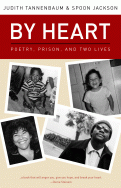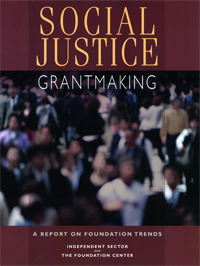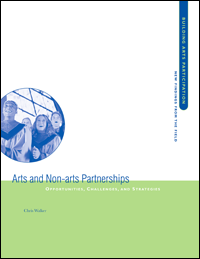Racial Equity
Grantmakers in the Arts (GIA) is committed to addressing structural inequities and increasing philanthropic and government support for BIPOC artists and arts organizations. Racial equity is a lens through which GIA aims to conduct all of its work, as well as a specific area of its programming.
Since 2008, GIA has been elevating racial equity as a critical issue affecting the field. To actualize this work within the sector, GIA published its Racial Equity in Arts Funding Statement of Purpose in 2015. Through webinars, articles, convenings, and conference sessions, GIA provides training and information to support arts funders in addressing historic and structural inequity through their grantmaking practices as part of an effort for racial justice as a means toward justice for all.
GIA believes that all oppressed groups should benefit from funding. We give primacy to race because racism is the means by which oppressed groups are manipulated into opposing programs that assist them. Therefore, Grantmakers in the Arts’ equity work – including our discussions of support for trans artists, artists with disabilities and for disability arts – is NOT race-exclusive but IS race-explicit. GIA’s vision for the future of our work is to increasingly reveal how the liberation of all oppressed people is interdependent.
GIA has made a strategic decision to foreground racial equity in our work for several reasons:
- Within other oppressed peoples’ communities (including women, members of the lgbtqi community, people with disabilities, and others), it has been well-documented that people of color still face the worst social outcomes.
- GIA feels that others’ strategies of combining considerations of race with other considerations too often result in racialized people being pushed into the background or ignored.
- The U.S.’ creation of race was established to keep oppressed peoples separate.
Unless we articulate our support for racialized peoples, while calling out this separation strategy, we inadvertently reinforce this separation strategy.
Specific themes of our racial equity programming include:
- The analysis of how funding practices create structural challenges for BIPOC (Black, Indigenous, People of Color)/ALAANA (African, Latinx, Asian, Arab, Native-American) organizations (Eurocentric quality standards, matching requirements, among others).
- The impact of these practices, as manifest in racialized disparities in levels of funding.
- An exploration of the use of coded language to justify racial inequity (i.e. referring to white audiences as “general” or “mainstream,” while organizations of color are “culturally-specific.”
When it comes to self-identifying language, GIA seeks to use terms that communicate our respect. We do not seek to impose language on members of any group. We respect the manner in which anyone prefers to self-identify.When referring to issues of racial equity, “we use the term BIPOC to highlight the unique relationship to whiteness that Indigenous and Black people have, which shapes the experiences of and relationship to white supremacy for all people of color within a U.S. context.” We take this explanation and practice from the BIPOC Project.
GIA has also used the racial and ethnic identifiers African, Latinx, Asian, Arab, and Native American. We have used African, Latinx, Asian, Arab, Native American – represented using the acronym ALAANA – because we know that many believe the term, “people of color,” conflates together entire groups of people and as a contrast to white. This results in a continued centering of whiteness as the norm and the standard from which other identities deviate.
GIA does not refer to organizations that are founded by, led by, and feature the work of ALAANA/BIPOC communities as “culturally-specific,” as we believe this term centers whiteness as the norm from which other organizations deviate.
GIA is committed to communicating respectfully. GIA does not ask that anyone self-identify with or use any term other than ones they prefer.
2009, 126 pages, ISBN: 978-0-615-27727-1. National Committee for Responsive Philanthropy, 1331 H St NW, Ste 200, Washington, DC, 20005, 202-387-9177 www.ncrp.org
Read More...2010, 44 pages, Ford Foundation, 320 E 43d St, New York, NY, 10017, 212-573-5000 www.fordfoundation.org
Read More...2009, 123 pages. Los Angeles County Museum of Natural History Foundation, 900 Exposition Blvd, Los Angeles, CA, 90007, 213-763-3466, www.nhm.org
Read More...September 2008, 53 pages. John D. and Catherine T. MacArthur Foundation, 140 S. Dearborn St, Chicago, IL, 60603, 312-726-800, www.macfound.org
Read More...While researching for a town hall meeting held last fall at New Dramatists to discuss the low numbers of female written plays reaching production, I noticed that, by every estimate, work by women made up only approximately 17% of the total number of new plays produced in this country; yet, in an apparent paradox, 31% of the plays on the Theater Communication Group’s list of the “Top Ten Most Produced Plays in American Theatre” were written by women.
Read More...
April 2010, 224 pages, ISBN 978-0-9815593-5-3. New Village Press, PO Box 3049, Oakland, CA, 94609, 510-420-1361, www.newvillagepress.net
Read More...On May 12th, more than 60 artists and creative organizers engaged in civic participation, community development, education, social justice activism, and philanthropy came together for a White House briefing on Art, Community, Social Justice, National Recovery.
Read More...2010, 16 pages, The Urban Institute, 2100 M Street NW, Washington, D.C., 20037, (202) 833-7200 http://www.urban.org
Download:
![]() Arts and Non-arts Partnerships (2.1Mb)
Arts and Non-arts Partnerships (2.1Mb)

Independent Sector and the Foundation Center have partnered in developing this research, resulting in a quantitative study of social justice funding by 1,000 of the largest private and community foundations in the U.S.
Read More...

